 Does fear of criminal victimization contribute to white Americans’ enthusiastic support for ‘gun rights’? While those in favor of less arms control link gun rights to fear of crime and self-protection, Alexandra Filindra takes a look at the notion that Americans support gun ownership on the grounds of personal protection. Finding that the gun owning population is much whiter than the American population as a whole, the authors prove that fear of crime, real or imagined, does not explain why Americans have been more supportive of gun rights in the past years.
Does fear of criminal victimization contribute to white Americans’ enthusiastic support for ‘gun rights’? While those in favor of less arms control link gun rights to fear of crime and self-protection, Alexandra Filindra takes a look at the notion that Americans support gun ownership on the grounds of personal protection. Finding that the gun owning population is much whiter than the American population as a whole, the authors prove that fear of crime, real or imagined, does not explain why Americans have been more supportive of gun rights in the past years.
Every year, some 12,000 people in the United States die from gunfire. Another 25,000 are injured by gun shots. Gun violence has been described by public health experts as an epidemic that may even be contagious. Gun violence has declined precipitously since the early 1990s when it reached its highest levels, but the number of gun deaths and injuries in the United States far exceeds the rates in all other industrialized countries. A recent analysis calculated that the United States accounts for 82 percent of all gun-related deaths across 23 nations. Scholars attribute this form of American exceptionalism to the country’s laissez-faire gun laws.
Many have charged that the lax regulatory regime in the United States as it applies to firearms is the result of lobbying by gun manufacturers and the National Rifle Association (NRA). The financial and political influence of the NRA in the halls of Congress is notable, and this power is bolstered by Americans’ enthusiasm for guns and gun rights. Yet, this passion is not evenly spread across all subgroups of the American public. Gun ownership and support for gun rights is to a large extent a white concern.
The General Social Survey has been tracking gun ownership rates in the United States since the 1970s and found that the share of the gun-owning population that is white has remained at about 90 percent for more than five decades (Figure 1). However, those who identify as Caucasian in the U.S. population has declined from 84 percent in 1970 to 64 percent in the most recent decennial census. This suggests that the gun owning population is much whiter than the American population as a whole.
Figure 1: Whites as Share of the Gun-Owning Population (Source: General Social Survey, 1973-2014)
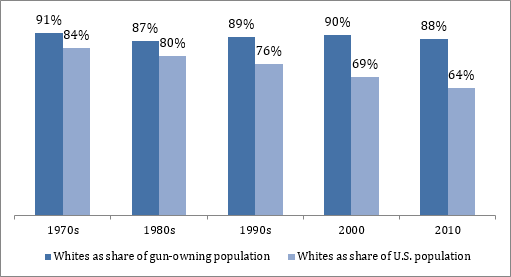
A similar picture emerges on the issue of gun rights. Data from the Pew Research Center show that since 1993 when Pew first started to collect information on gun policy attitudes, there has been a substantial gap between white and minority support for gun rights. Since 2005, the gap has widened significantly. By 2016, 61 percent of whites said that “protection of gun rights” is more important than controlling ownership of guns while only half as many blacks and Latinos provided the same response. A 2015 national survey conducted by the author and her collaborator, Noah Kaplan, asked a nationally representative sample of white and black respondents to rank the importance of various constitutional freedoms and rights. As can be seen in Figure 2, fewer than half (47 percent) of whites ranked the right to vote as an important government guarantee compared to 57 percent of blacks. By comparison, 86 percent of whites said that the “right to bear arms” is an important right compared to 26 percent of blacks. Clearly, the idea of gun rights resonates deeply with white America.
Figure 2. Right to Vote v. Right to Bear Arms, by Race (2015)
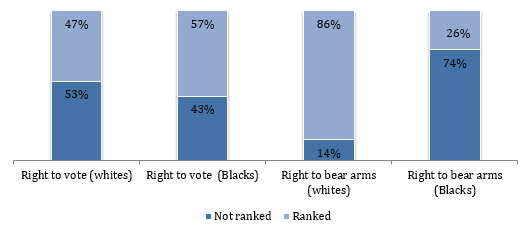
What explains this discrepancy in attitudes about firearms and gun control? Why is it that white Americans more so than minorities assign such importance to gun rights? One commonly offered but incorrect explanation is fear of crime. Sociological research has sought to link gun ownership and attitudes about gun control to fear of crime positing that a key reason why people support the unrestricted sale of firearms is because they want to have easy access to weapons should they judge their safety to be in danger. Surveys bear out this relationship in the public’s mind: according to the Pew Research Center, 48 percent of gun-owners say they own guns for protection. In the author’s 2015 survey, 67 percent of all white Americans mentioned that in their view, guns protect people from crime. A similar number (64 percent) said that they would feel safer with a gun in the home; beliefs about the protective power of firearms are widespread among white Americans, even among those who do not own firearms. However, statistical analyses and experimental evidence do not bear out the hypothesis that support for gun rights and opposition to gun control are motivated by fear of crime.
First, public perceptions of the prevalence of crime and of personal vulnerability have been stable for many years but they do not match reality. Since 1989, the Gallup Poll has shown that large majorities of Americans believe that there is more crime in the country than in the previous year- a pattern that is as persistent as it is inconsistent with official statistics. Studies have shown that groups with comparatively low risk of victimization, such as the elderly, women, and white individuals are more likely to be fearful. Sociologists tend to think of people’s perceptions of crime as a “social fact,” – an expression of group-based anxieties more so that a calculous of risk.
Second, studies of gun policy preferences among general population samples and my work with Noah Kaplan with samples of white respondents show a positive correlation between measures of fear of crime and support for gun control. This suggests that Americans who indicate higher levels of fear of crime are more likely to support gun control measures, not less likely to do so.
A paper Noah Kaplan and I presented at the Midwest Political Science Association conference (April 2017), further substantiated this relationship through priming experiments. In these experiments, white survey respondents were divided into two groups: one group was asked to read a newspaper story about a home invasion that led to the murder of the homeowner; the other group –the control—received no such story. Both groups were then asked questions about the prevalence of crime and their crime-related fears, as well as their opinion on a series of gun control policy proposals (e.g., do you support a ban on assault rifles?). Our analyses show that respondents exposed to the murder story were more likely to say that crime in the country has increased compared to those in the control group (Figure 3). Similarly, our respondents who read the murder story were more supportive of gun control measures than were those in the control group (Figure 4).
These experiments along with analyses of survey data that produce a similar picture provide strong evidence that fear of crime—whether grounded in realistic or exaggerated estimates of vulnerability, and whether personal or group-based—cannot explain why white Americans have become less supporting of gun control over the past several years. The growing opposition to gun control and corresponding enthusiasm for gun rights among white Americans that surveys have been registering is not the result of heightened fear of crime and the need for self-protection.
Gun Wall by Michael Saechang is licensed under CC BY-SA 2.0
This article is What about Fear of Crime?: White Americans’ Gun Control Preferences and the Role of (Racialized) Crime Considerations in Political Behavior.
Please read our comments policy before commenting.
Note: This article gives the views of the author, and not the position of USAPP – American Politics and Policy, nor of the London School of Economics.
Shortened URL for this post: http://bit.ly/2phSkLX
_________________________________
 Alexandra Filindra – University of Illinois at Chicago
Alexandra Filindra – University of Illinois at Chicago
Alexandra Filindra is Assistant Professor of Political Science and Psychology at the University of Illinois at Chicago. Dr. Filindra specializes in public opinion and public policy, race and ethnicity, and immigration politics in the United States. Her work has appeared in several peer reviewed journals such as Political Behavior, Policy Studies Journal, Social Science Quarterly, and others. She is currently writing a book (with Noah Kaplan) on white Americans’ gun policy preferences and the role of racial prejudice.


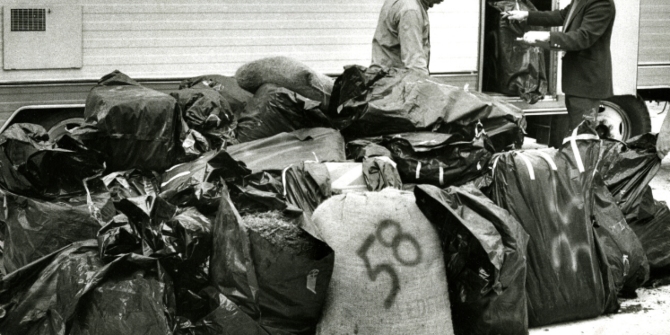
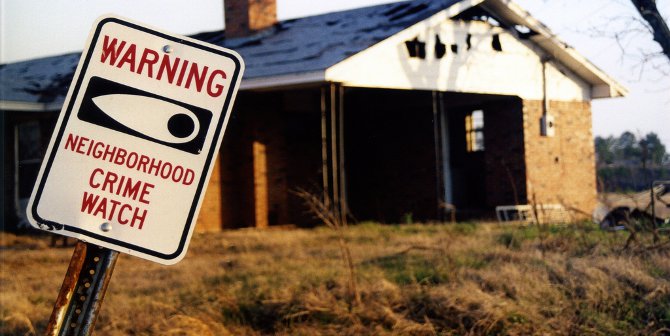

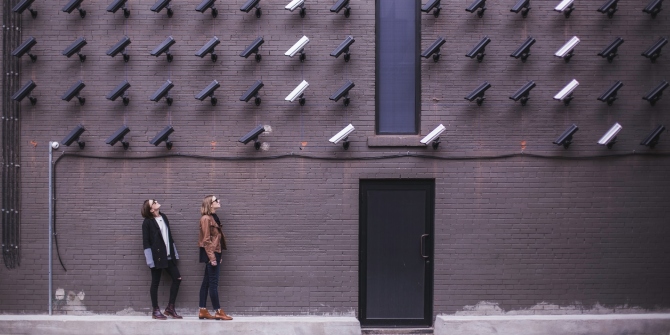

Thank you for this persuasive and rich article. We understand that it is primarily not fear or self protection that explains the apparent gun enthusiasm. Is there a positive hypothesis about what then does explain it? With thanks.